Hello peeeepss!
welcome back with me!!^^
this time, i will inform you about Quantifiers, enjoyy it!!
What are quantifiers?
A quantifier is a word or phrase which is used before a noun to indicate the amount or quantity:
'Some', 'many', 'a lot of' and 'a few' are examples of quantifiers.
Quantifiers can be used with both countable and uncountable nouns.
Examples:
There are some books on the desk
He's got only a few dollars.
How much money have you got?
There is a large quantity of fish in this river.
He's got more friends than his sister.
Examples of quantifiers
With Uncountable Nouns
much
a little/little/very little *
a bit (of)
a great deal of
a large amount of
a large quantity of
With Both (countable & uncountable)
all
enough
more/most
less/least
no/none
not any
some
any
a lot of
lots of
plenty of
With Countable Nouns
many
a few/few/very few **
a number (of)
several
a large number of
a great number of
a majority of
* NOTE
little, very little mean that there is not enough of something.
a little means that there is not a lot of something, but there is enough.
** NOTE
few, very few mean that there is not enough of something.
a few means that there is not a lot of something, but there is enough.
Soo guyss, hope this material will useful with you!
see you!
cc:SUMBER INFORMASI
Diah Syawalia's
Created by Diah Syawalia
Minggu, 08 Desember 2019
Sabtu, 23 November 2019
Cara Membuat Powerpoint yang Simple dan Menarik
Halo teman-teman!!
Sekarang saya ingin membagikan kepada kalian bagaimana cara membuat powerpoint yang menarik versi saya.
cara membuat powerpoint menarik:
1. Memilih warna background yang sesuai, dan tidak terlalu banyak gambar
2. hindari gambar yang berformat GIF karena tidak efektif dalam PowerPoint. gambar yang berformat GIF bisa saja digunakan. tetapi dengan jumlah tidak terlalu banyak.
3. Hindari text berlebihan dalam Powerpoint itu sendiri. Sesuai namanya, maka dalam slide powerpoint haruslah hanya point-point yang ingin disampaikan.
4. Memberikan warna yang padu dan sesuai baik dari isi, judul maupun background.
5. Menggunakan transisi dan animasi seperlunya.
6. Gunakan gambar untuk membuat Powerpoint lebih menarik.
berikut ini contoh powerpoint yang saya buat:
DOWNLOAD CONTOH PPT
Demikian informasi yang dapat saya berikan. semoga bermanfaaaat!!
see you in another postttt!
Sekarang saya ingin membagikan kepada kalian bagaimana cara membuat powerpoint yang menarik versi saya.
cara membuat powerpoint menarik:
1. Memilih warna background yang sesuai, dan tidak terlalu banyak gambar
2. hindari gambar yang berformat GIF karena tidak efektif dalam PowerPoint. gambar yang berformat GIF bisa saja digunakan. tetapi dengan jumlah tidak terlalu banyak.
3. Hindari text berlebihan dalam Powerpoint itu sendiri. Sesuai namanya, maka dalam slide powerpoint haruslah hanya point-point yang ingin disampaikan.
4. Memberikan warna yang padu dan sesuai baik dari isi, judul maupun background.
5. Menggunakan transisi dan animasi seperlunya.
6. Gunakan gambar untuk membuat Powerpoint lebih menarik.
berikut ini contoh powerpoint yang saya buat:
DOWNLOAD CONTOH PPT
Demikian informasi yang dapat saya berikan. semoga bermanfaaaat!!
see you in another postttt!
Minggu, 03 November 2019
Learn English - Helping Verbs
Helping verbs are also called "auxiliary verbs".
Helping verbs have no meaning on their own. They are necessary for the grammatical structure of a sentence, but they do not tell us very much alone. We usually use helping verbs with main verbs. They "help" the main verb (which has the real meaning). There are only about 15 helping verbs in English, and we divide them into two basic groups:
Primary helping verbs (3 verbs)
These are the verbs be, do, and have. Note that we can use these three verbs as helping verbs or as main verbs. On this page we talk about them as helping verbs. We use them in the following cases:
be
- to make continuous tenses (He is watching TV.)
- to make the passive (Small fish are eaten by big fish.)
have
- to make perfect tenses (I have finished my homework.)
do
- to make negatives (I do not like you.)
- to ask questions (Do you want some coffee?)
- to show emphasis (I do want you to pass your exam.)
- to stand for a main verb in some constructions (He speaks faster than she does.)
Modal helping verbs (10 verbs)
We use modal helping verbs to "modify" the meaning of the main verb in some way. A modal helping verb expresses necessity or possibility, and changes the main verb in that sense. These are the modal verbs:
- can, could
- may, might
- will, would,
- shall, should
- must
- ought to
Here are examples using modal verbs:
- I can't speak Chinese.
- John may arrive late.
- Would you like a cup of coffee?
- You should see a doctor.
- I really must go now.
Program Menghitung Berat Badan Ideal dengan C++
Hai guyss!
Kembali lagi bersamakuu hehe
jadi, materi kali ini tentang program c++
#include <iostream>
#include <stdlib.h>
using namespace std;
int main() {
int tb, bbi;
cout<<"Menghitung
Berat Badan Ideal Anda
"<<endl<<endl<<"-------------------"<<endl;
cout<<"Masukkan
tinggi badan (dalam cm) : ";
cin>>tb;
system("cls");
bbi=tb-100-(0.1*(tb-100));
cout<<"Berat badan
ideal Anda"<<endl<<" "<<bbi<<"
Kg"<<" ";
}
Penjelasan kode program:
o
Int tb,bbi berarti
mendeklarasikan variable tb,bbi yang mempunyai tipe data integer atau bilangan bulat.
o
cout<< diikuti dengan teks yang
akan ditampilkan diapit dengan tanda kutip ganda. Digunakan untuk menampilkan
teks.
o
cout<< diikuti dengan nama
konstanta atau variable. Berfungsi untuk menampilkan nilai dari suatu konstanta
atau variable yang dimasukkan.
o
cin>> berfungsi memasukkan data
dari keyboard kemudian diikuti dengan nama variable atau nama konstanta.
o
bbi=tb-100-(0.1*(tb-100)) merupakan rumus atau operator yang dimasukkan
kedalam variable bbi tanda * berfungsi sebagai perkalian.
o
<<endl digunakan untuk memindahi
tampilan pada baris berikutnya.
o
System(“cls”) digunakan untuk membersihkan layar yang terdapat d
#include <stdlib.h>
Output
Subject-Verb Agreement
Hay guys!!
I Have a English Material Again.
Hope it will be useful for you guys!
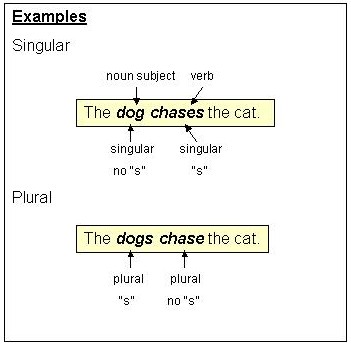

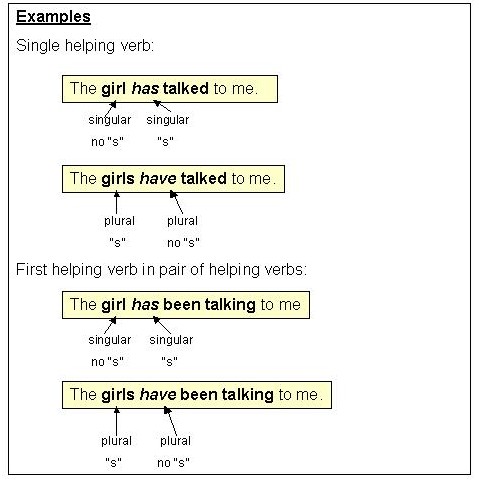
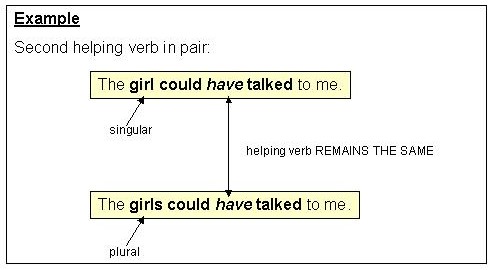
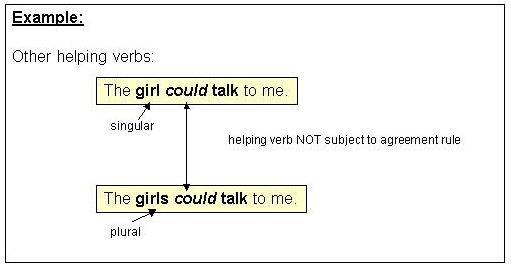
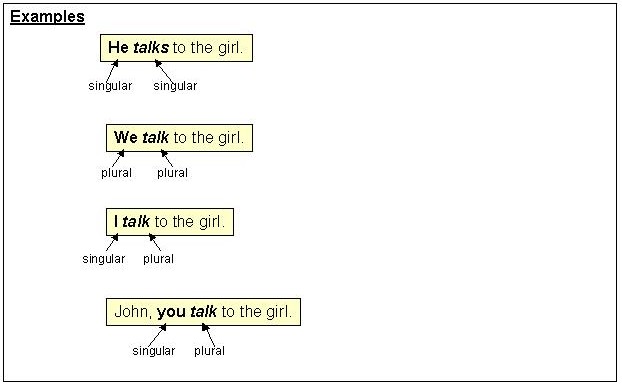
I Have a English Material Again.
Hope it will be useful for you guys!
Subjects and verbs must AGREE with one another in number (singular or plural). Thus, if a subject is singular, its verb must also be singular; if a subject is plural, its verb must also be plural.
In the present tense, nouns and verbs form plurals in opposite ways: nouns ADD an s to the singular form; verbs REMOVE the s from the singular form.

These agreement rules do not apply to verbs used in the simple past tense without any helping verbs.

The agreement rules do, however, apply to the following helping verbs when they are used with a main verb: is-are, was-were, has-have, does-do.

The agreement rules do not apply to has-have when used as the SECOND helping verb in a pair.

They do NOT apply to any other helping verbs, such as can, could, shall, should, may, might, will, would, must.

The subject-verb agreement rules apply to all personal pronouns except I and you, which, although SINGULAR, require PLURAL forms of verbs.

Possessive Pronouns
Hello guys!
so guyssssss, i am back!! with new material.
so here is ittt!!
cc:https://dictionary.cambridge.org/grammar/british-grammar/pronouns-possessive-my-mine-your-yours-etc
so guyssssss, i am back!! with new material.
so here is ittt!!
Personal Pronoun
|
Possessive Determiner
|
Possessive Dronoun
|
I
|
my
|
mine
|
you (singular and plural)
|
your
|
yours
|
he
|
his
|
his
|
she
|
her
|
hers
|
it
|
its
|
its*
|
we
|
our
|
ours
|
they
|
their
|
theirs
|
one
|
one’s
|
one’s*
|
*We avoid using its and one’s as possessive pronouns except when we use them with own:
The house seemed asleep yet, as I have said, it had a life of its own.
One doesn’t like to spend too much time on one’s own.
Typical errors
- We don’t use ’s after possessive pronouns:
Are those gloves hers?
Not: Are those gloves her’s?
- ’s is not used with the possessive pronoun its. It’s means ‘it is’:
The team is proud of its ability to perform consistently well.
Not: … proud of it’s ability …
- We don’t use another determiner with a possessive determiner:
I’m going to get my hair cut this afternoon.
Not: … get the my hair cut …
- We don’t use possessive determiners on their own. They are always at the beginning of noun phrases:
That’s not my book. It’s yours. (or It’s your book.)
Not: It’s your.
- We don’t use possessive pronouns before nouns:
Lots of our friends were at the party.
Not: Lots of ours friends …
Rabu, 16 Oktober 2019
Contoh KOP SURAT Perusahaan
Berikut merupakan contoh KOP SURAT PERUSAHAAN:
Cara membuatnya yaitu
1. Buka Microsoft Word
2. Klik 2x bagian atas kertas dan akan muncul header
3. Kreasi sesuai keinginan kalian
4. Jika ingin menambahkan logo klik Insert Picture
5. Jika ingin menambahkan garis klik Insert Shapes
6. Jika ingin mengubah warna tulisan dan ukuran tulisan. select tulisan yang ingin diubah kemudian klik Home dan ubahlah sesuai keinginan.
Semoga bermanfaat!
Langganan:
Komentar (Atom)
Quantifiers Countable & Uncountable Nouns
Hello peeeepss! welcome back with me!!^^ this time, i will inform you about Quantifiers, enjoyy it!! What are quantifiers? A quantif...
-
Berikut merupakan contoh KOP SURAT PERUSAHAAN: Cara membuatnya yaitu 1. Buka Microsoft Word 2. Klik 2x bagian atas kertas dan a...
-
Hai guyss! Kembali lagi bersamakuu hehe jadi, materi kali ini tentang program c++ #include <iostream> #include <s...
-
Hello guys! I have some info for u this is for you who want to learn about basic English. the topic is Singular & Plural Nouns. an...




